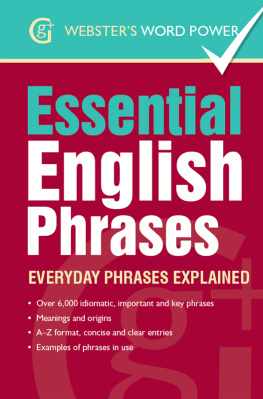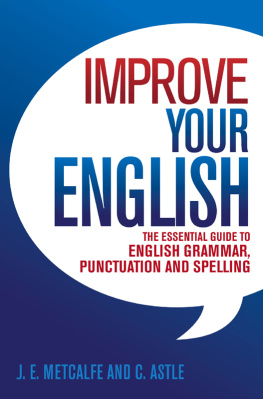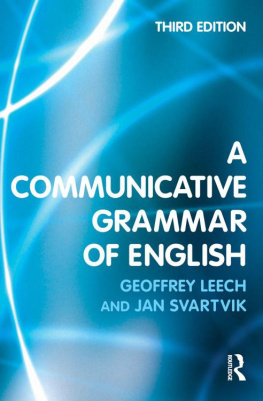 Never has there been a greater need to make sure that you write and speak good English. This is true of people in countries such as the UK where English is the native language and of people in countries where English is a second or foreign language. In countries where English is the language of business, a marked emphasis is now being placed on the need for competent communicative skills in the workplace. Although life in the modern world is generally less formal than it was and people in personal, academic and business contexts write considerably fewer letters than formerly, they are often still required to demonstrate their powers of written communication in the classroom and the workplace. For example, they might have to write a report for presentation to their work colleagues. When it comes to correspondence, emails may have taken over from formal letters to a large extent but it reflects badly on a person if their emails are sloppily written and full of errors.
Never has there been a greater need to make sure that you write and speak good English. This is true of people in countries such as the UK where English is the native language and of people in countries where English is a second or foreign language. In countries where English is the language of business, a marked emphasis is now being placed on the need for competent communicative skills in the workplace. Although life in the modern world is generally less formal than it was and people in personal, academic and business contexts write considerably fewer letters than formerly, they are often still required to demonstrate their powers of written communication in the classroom and the workplace. For example, they might have to write a report for presentation to their work colleagues. When it comes to correspondence, emails may have taken over from formal letters to a large extent but it reflects badly on a person if their emails are sloppily written and full of errors.
The computer spell checker can only help you out to some extent. Many employers complain that a significant number of the people whom they recruit for jobs are sadly lacking in these skills. This is true even of young people who have just graduated from some of the top universities. You might think that grammar and spelling are trivial matters, that theyre just not that important in your line of work. You might think that as long as the facts are correct, what does it matter if the grammar is bad? However, poor grammar reflects badly on youyou might miss out on a job opportunity, you might not be taken seriously when making a complaint, you could even put off a potential Internet dateall because of terrible grammar and sloppy spelling. Any public display of poor language skills can give a very bad impression of even the most intelligent person.
At the same time, the importance of English as a world language continues to grow. In fact, there are many versions of Standard English spoken around the world: British, American, Canadian, Australian, Indian, South African, New Zealand and more. All have rich variations in vocabulary, syntax, semantics and grammar. More and more people in other countries are anxious to learn English and there is an ever-increasing demand both for teachers of English as a second or foreign language and for effective teaching materials in these areas. But what is good English or even correct English? Dont those of us who learn it as a native tongue at our mothers knee automatically speak and write it correctly? Alas, the answer to that is no. Native speakers obviously have much less of a struggle learning to speak good English than learners of English as a foreign or second language do, but the process is not effort-free.
Good or correct English is often regarded as grammatical English. Grammar has been variously described as the framework on which ideas are hung, and the cement that binds words together. Basically, grammar refers to the rules that govern the way a language works. Society cannot operate without rules and neither can language. The prospect of learning grammar is more likely to depress those whose native tongue is English. Learners of English as a second or foreign language are used to having to come to grips with the grammar of their own languages and will not protest so much.
Often, the first time that people come into contact with written rules of grammar is when they come to learn a foreign language. The language is broken up into vocabulary, parts of speech, regular and irregular verbs, tenses, agreements and structures, etc. The rules of this foreign language seem more explicit, more grammatical than that of our own, but, of course, our own language has such rules, its just that we dont notice them. It might be surprising to hear that, if your first language is English, you do already know some English grammar. You can speak the language, you understand others, you can respond and make yourself understood. For example, we automatically know the difference in structure between a question (Can I have that?) and a command (Give me that!).
You started to learn English grammar as an infant without consciously knowing you were doing so. You learned what were the correct structures and combinations of words through hearing others speak andonce you learned how to readthrough the written word. Perhaps what you dont know about are the prescriptive rules that have been devised to describe English grammar. They used to be taught by rote in schools but emphasis on this side of teaching English has long since died out. Spoken and written English are enormously different in structure and formality. Spoken discourse is often disjointed, with sentence fragments used in preference to complete sentences that would perhaps sound uncomfortably formal, yet it is easily understood.
Even the worlds most articulate and witty people do not always speak using perfect, prescriptively ordered, grammatically correct English. Speech also employs stress, rhythm and intonation as an important part of conveying meaning. However, our written words need structure and formality to convey meaning as accurately and unambiguously as possible; and our spoken words can still sound wrong and give a bad impression if the formal rules are not followed. Grammar has, over the years, got rather a bad press. At one point, in the UK, it was set aside by the educational powers-that-be as being largely unnecessary. Although it is now often seen as something valuable that should be brought back into prominence, it is also often seen as something essentially difficult and boring.
This is not the case. It is logical and can be of great interest. Furthermore, you really have to get to grips with it if you want to improve your English. In conclusion, in order to speak and write effectively and confidently in English, you must know something about the structure of the language. This book gives a clear explanation of the nuts and bolts of English grammar as well as hints on how to create a better personal writing style incorporating good English. WEBSTER'S WORD POWERBetty Kirkpatrick, a graduate of Edinburgh University, has a long career in reference publishing.
She has edited Chambers Twentieth Century Dictionary, Rogets Thesaurus, the concise edition of Brewers Phrase and Fable, and was language consultant to the Encarta World English Dictionary. She has compiled various other reference books, including the Oxford Paperback Thesaurus and the Bloomsbury Dictionary of Clichs. She acts as a consultant to the Bloomsbury Good Word Guide. Betty is author of an extensive list of publications on various aspects of the English language for learners of English.  The most important unit of structure is the sentence. Most of the other grammatical units are parts that go together to form a sentence.
The most important unit of structure is the sentence. Most of the other grammatical units are parts that go together to form a sentence.
However, that leaves us with the question What is a sentence? and there has been some dispute about the definition. The traditional view of the sentence seems as good a jumping-off point as anya unit of language that can stand alone and make sense. The following are all complete in themselves, make sense and are, therefore, all sentences: We ran. The boy kicked the ball. They played hard and they won. Look over there! The following examples are also all complete in themselves and make sense and are, therefore, sentences.
They are known as or irregular sentences. They are called minor sentences because they lack some of the other usual grammatical features of a sentence. For example, a minor sentence often lacks a .
Next page











 Never has there been a greater need to make sure that you write and speak good English. This is true of people in countries such as the UK where English is the native language and of people in countries where English is a second or foreign language. In countries where English is the language of business, a marked emphasis is now being placed on the need for competent communicative skills in the workplace. Although life in the modern world is generally less formal than it was and people in personal, academic and business contexts write considerably fewer letters than formerly, they are often still required to demonstrate their powers of written communication in the classroom and the workplace. For example, they might have to write a report for presentation to their work colleagues. When it comes to correspondence, emails may have taken over from formal letters to a large extent but it reflects badly on a person if their emails are sloppily written and full of errors.
Never has there been a greater need to make sure that you write and speak good English. This is true of people in countries such as the UK where English is the native language and of people in countries where English is a second or foreign language. In countries where English is the language of business, a marked emphasis is now being placed on the need for competent communicative skills in the workplace. Although life in the modern world is generally less formal than it was and people in personal, academic and business contexts write considerably fewer letters than formerly, they are often still required to demonstrate their powers of written communication in the classroom and the workplace. For example, they might have to write a report for presentation to their work colleagues. When it comes to correspondence, emails may have taken over from formal letters to a large extent but it reflects badly on a person if their emails are sloppily written and full of errors. The most important unit of structure is the sentence. Most of the other grammatical units are parts that go together to form a sentence.
The most important unit of structure is the sentence. Most of the other grammatical units are parts that go together to form a sentence.